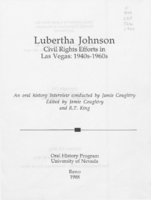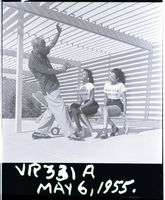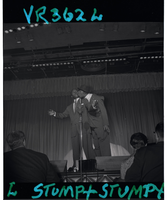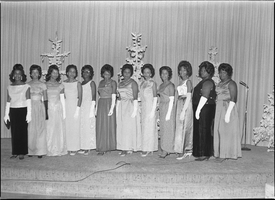Search the Special Collections and Archives Portal
Search Results

Edited narrative of interview with Lubertha Johnson by Jamie Coughtry, 1988
Date
Description
Edited narrative of an interview with Lubertha Johnson by Jamie Coughtry, dated 1988. Recalling her youth in Mississippi and move to Las Vegas, Johnson discusses civil rights, discrimination, and other topics between 1940 and 1970.
Text

Film negatives of showgirls posing for Moulin Rouge publicity, May 6, 1955
Date
Description
Series of four black and white film negatives of two showgirls posing in Moulin Rouge T-shirts at the Moulin Rouge prior to opening day, dated May 6, 1955.
Image

Film negatives of comedy team Stump and Stumpy at the Moulin Rouge opening show, May 24, 1955
Date
Description
Series of two black and white negatives of comedy team Stump and Stumpy (James Cross and Harold Cromer) performing in the Moulin Rouge opening show, dated May 24, 1955.
Image
S. J. Johnson oral history interview
Identifier
Abstract
Oral history interview with S. J. Johnson conducted by Claytee D. White on May 24, 2016 for the African Americans in Las Vegas: a Collaborative Oral History Project. In this interview, Johnson discusses his early life in Indianapolis, Indiana and living on his family's farm. He recalls joining the United States Air Force, adjusting to life outside of the family farm, and experiencing discrimination while serving. Johnson talks about being stationed in Panama, joining the Air Force Office of Special Investigations (AFOSI), and becoming a military officer. Later, Johnson discusses his move to Las Vegas, Nevada in 1982, attending the University of Nevada, Las Vegas, and obtaining his teaching license. Lastly, Johnson talks about the importance of education.
Archival Collection
Katherine Duncan and Sarann Knight Preddy
Identifier
Abstract
Oral history interview with Katherine Duncan and Sarann Knight Preddy conducted by Claytee D. White on November 11, 2004 for the Boyer Early Las Vegas Oral History Project. In this interview Katherine Duncan and Sarann Preddy speak about creating a black cultural/historical tour of Las Vegas, Nevada. Preddy also discusses buying the Moulin Rouge Hotel and Casino to preserve its history. Both women then talk about racism, segregation, and the involvement of African Americans in the history of Las Vegas.
Archival Collection
James Matson oral history interview
Identifier
Abstract
Oral history interview with James Matson conducted by Ken Rose on February 23, 1980 for the Ralph Roske Oral History Project on Early Las Vegas. In the interview, Matson discusses his early life in Pensacola, Florida and moving to Las Vegas, Nevada to work in resort and housing construction in 1952. Matson also discusses his family, his part-time work as a personal security guard, and the growth of Las Vegas. Lastly, he discusses African American racial discrimination and economic opportunities in Las Vegas in the 1950s to the 1980s.
Archival Collection
Henry Shepherd oral history interview
Identifier
Abstract
Oral history interview with Henry Shepherd conducted by Claytee D. White on October 22, 2014 for the Boyer Early Las Vegas Oral History Project. Shepherd discusses being an African-American bartender on the Las Vegas, Nevada Strip, hired as a result of the 1971 consent decree. He also recalls memories of Jackson Street, the homes in North Las Vegas, and the hotels in downtown Las Vegas and on the Strip.
Archival Collection

Set of photographs including Debutante Ball pre-breakfast
Date
Archival Collection
Description
Photographer's notations: 64 Deb's Ball, Pre-Breakfast. Some photos from this set were previously online with the digital ID pho023780.
Image

Transcript of Interview with Ruby Duncan by Claytee D. White on February 13 and March 2, 2007
Date
Archival Collection
Description
Interview with Ruby Duncan conducted by Claytee White in two sessions on February 13, 2007 and March 2, 2007. Duncan discusses her employment history and dependence on public assistance in Las Vegas, as well as her participation in the Welfare Rights Movement and Operation Life.
Text
John West oral history interview
Identifier
Abstract
Oral history interview with John West conducted by Claytee D. White on August 10, 2000 for the Boyer Early Las Vegas Oral History Project. In this interview, West discusses his family background and arriving to Las Vegas, Nevada in 1954. West describes his educational experiences in Las Vegas and his career as a clinical psychologist. He recalls his father’s career in medicine and becoming the first African American licensed medical doctor in Las Vegas. West then talks about attending entertainment events before race integration was introduced, and the voting patterns in West Las Vegas. Lastly, West discusses his father’s decision to remain living in West Las Vegas and operating his medical office there after integration.
Archival Collection
